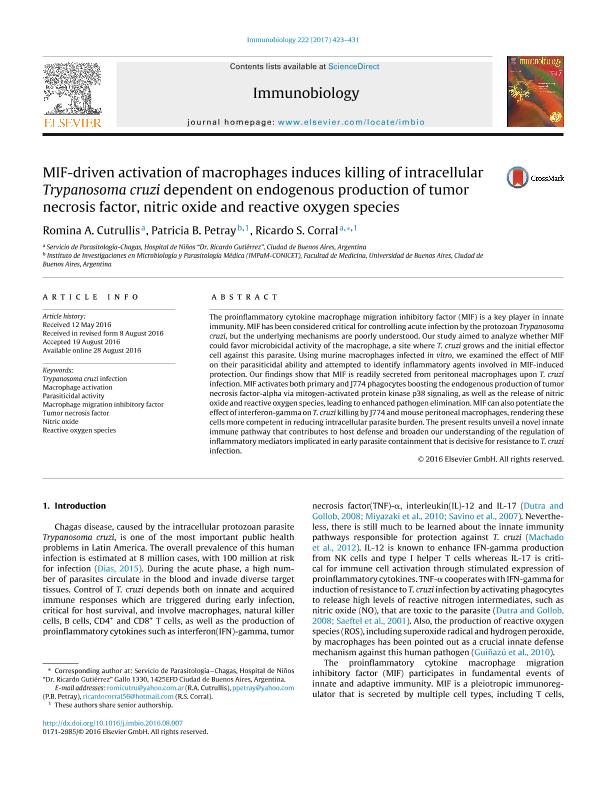Artículo
MIF-driven activation of macrophages induces killing of intracellular Trypanosoma cruzi dependent on endogenous production of tumor necrosis factor, nitric oxide and reactive oxygen species
Fecha de publicación:
02/2017
Editorial:
Elsevier Gmbh
Revista:
Immunobiology
ISSN:
0171-2985
Idioma:
Inglés
Tipo de recurso:
Artículo publicado
Clasificación temática:
Resumen
The proinflammatory cytokine macrophage migration inhibitory factor (MIF) is a key player in innate immunity. MIF has been considered critical for controlling acute infection by the protozoan Trypanosoma cruzi, but the underlying mechanisms are poorly understood. Our study aimed to analyze whether MIF could favor microbicidal activity of the macrophage, a site where T. cruzi grows and the initial effector cell against this parasite. Using murine macrophages infected in vitro, we examined the effect of MIF on their parasiticidal ability and attempted to identify inflammatory agents involved in MIF-induced protection. Our findings show that MIF is readily secreted from peritoneal macrophages upon T. cruzi infection. MIF activates both primary and J774 phagocytes boosting the endogenous production of tumor necrosis factor-alpha via mitogen-activated protein kinase p38 signaling, as well as the release of nitric oxide and reactive oxygen species, leading to enhanced pathogen elimination. MIF can also potentiate the effect of interferon-gamma on T. cruzi killing by J774 and mouse peritoneal macrophages, rendering these cells more competent in reducing intracellular parasite burden. The present results unveil a novel innate immune pathway that contributes to host defense and broaden our understanding of the regulation of inflammatory mediators implicated in early parasite containment that is decisive for resistance to T. cruzi infection.
Archivos asociados
Licencia
Identificadores
Colecciones
Articulos(IMPAM)
Articulos de INSTITUTO DE INVESTIGACIONES EN MICROBIOLOGIA Y PARASITOLOGIA MEDICA
Articulos de INSTITUTO DE INVESTIGACIONES EN MICROBIOLOGIA Y PARASITOLOGIA MEDICA
Citación
Cutrullis, Romina Andrea; Petray, Patricia Beatriz; Corral, Ricardo Santiago; MIF-driven activation of macrophages induces killing of intracellular Trypanosoma cruzi dependent on endogenous production of tumor necrosis factor, nitric oxide and reactive oxygen species; Elsevier Gmbh; Immunobiology; 222; 2; 2-2017; 423-431
Compartir
Altmétricas




